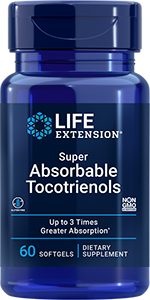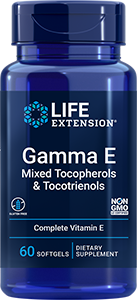
Tocotrienols Benefits: Why Vitamin E Is Good for You
Published: June 2023
Our bodies go through a lot of wear and tear every day, thanks to both exposure to the environment and the toll taken by our basic bodily functions. One important form of this wear and tear is called oxidative stress, and fortunately there is a powerful weapon against it: antioxidants. And one of the most potent antioxidants around is vitamin E, which is terrific at helping to keep oxidative stress at bay—so our bodies can keep on keeping on.
But life moves pretty fast, and it can be difficult to get enough vitamin E from food alone. If you want to help your body take it "E"-asy and support whole-body health, it's time to consider a high-quality vitamin E supplement, which by very definition should include the tocotrienols form of vitamin E.
What are vitamin E tocotrienols?
Vitamin E is a lipid-soluble vitamin that occurs naturally in eight different forms, called isoforms. These isoforms are alpha-tocotrienol, beta-tocotrienol, delta-tocotrienol, and gamma-tocotrienol (sometimes written as α-tocotrienol, ß-tocotrienol, δ-tocotrienol, and γ-tocotrienol, respectively), in addition to alpha-tocopherol, beta-tocopherol, delta-tocopherol, and gamma-tocopherol.
All of these forms offer various health benefits—and yet, many vitamin E formulas only offer the tocopherol forms. So let's get into why tocotrienols are also "E"-ssential!
Tocotrienols vs. tocopherols
The vitamin E family is composed of tocopherol and tocotrienol subgroups. The distinction between them is a slight difference in their molecular makeup that impacts how they work within the body. (Fellow science fans, that difference is this: each contains what is known as a chromanol ring attached to a side chain of carbon and hydrogen atoms, which differs depending on the isoform.)
Different isoforms confer different health benefits. Let's get into the benefits of each type.
Health benefits of tocotrienols and vitamin E
Tocotrienols have been found to contribute to a myriad of whole-body benefits, ranging from cardiovascular support to healthy hair to helping protect against naturally occurring age-related changes in our bodies. You will surely be "E"-lated after adding them to your supplement routine!
1. Antioxidant activity
Perhaps the most well-known benefit of this superstar vitamin is its potent antioxidant ability. Studies have identified that tocotrienols are stronger antioxidants than any tocopherol, allowing them to protect the body from daily oxidative stress.
2. Inflammation management
Along with protecting against oxidative stress, the tocotrienol form of vitamin E also helps support a healthy inflammatory response. A meta-analysis of 13 clinical studies found that tocotrienol supplementation helped support healthy levels of C-reactive protein (CRP), a marker of inflammation.
3. Bone health
Animal studies suggest that tocotrienols help support the formation of cells that help maintain and build strong bones; they also help inhibit the development of cells that break down bone.
4. Cardiovascular health
If you're living a heart-smart lifestyle, chances are you're trying to keep those cholesterol levels exactly where they're supposed to be. Tocotrienols inhibit the activity of the enzyme 3-hydroxy-3-methyl-glutaryl-CoA Reductase, also known as HMG-CoA Reductase, which plays a role in cholesterol production. In humans, a tocotrienol-rich fraction isolated from rice bran helped support healthy cholesterol levels. But wait, there's more! Palm oil enriched with these nutrients was found in a preclinical study to modulate the activity of proliferator-activated receptors to support blood vessel health. Talk about a great partner to your omega-3 fatty acids!
5. Anti-aging
You might not think about it this way, but the whole concept of "aging" really is about damage to your DNA, which happens to us all with time. In one clinical trial, tocotrienol supplementation for 6 months was found to help protect DNA.
6. Healthy cell division
In that same vein, tocotrienols have emerged, in preclinical studies, as potential senolytics that also help support healthy cell division when taken in combination with quercetin. Together, this powerful duo could help clear the body of aging cells while keeping young cells healthy.
7. Skin
Father Time never stops, but that doesn't mean you need to give in to the appearance of wrinkles. Vitamin E helps support skin health by protecting against UV exposure and promoting a healthy inflammatory response in skin. Topical versions have been found to be more effective than oral versions, so incorporate a lotion with vitamin E into your skincare routine!
8. Healthy hair
Split ends, frizzy hair, flyaways – we've all dealt with a bad hair day. Taming these starts with supporting your hair health to keep it flowing. A study found that volunteers who were given a tocotrienol mixture daily reported a 34.5% increase in hair after 8 months, but placebo reported a 0.1% decrease. Pair this with saw palmetto for even more support as you work to maintain those healthy locks and waves.
Explore Our Best Anti-Aging & Longevity Supplements
9. Brain health
We all want to keep our mind sharp as we age and the brain controls almost everything in the body, so it's important to give it the nutrients it needs to stay healthy. Preclinical and clinical research has found that tocotrienols exert a beneficial effect on brain health. In a study including 121 volunteers, two years of tocotrienol supplementation was shown to help protect the brain's white matter, or the myelinated projections of brain cells.
10. Eye health
Luckily, vitamin E helps support those beautiful lookers! In a clinical trial conducted over 6 years, vitamin E in combination with vitamin C, beta carotene, and zinc helped support healthy vision.
11. Immune health
Previous studies on the effect of vitamin E on the immune system have traditionally focused on alpha-tocopherol. (More on that below!) But other forms of tocopherol and tocotrienol such as gamma-tocotrienol (γ-tocotrienol, sometimes called gamma-T3) may also support healthy immune function by supporting immune cell health and communication. In fact, a clinical study found that supplementation with a tocotrienol-rich fraction helped support immune responses.
12. Liver health
The liver works hard every day to detoxify your body and support healthy metabolism. As a result, it is subject to constant oxidative stress. The beneficial properties of tocotrienols in the liver reach beyond the popular alpha-tocopherol; a systematic review of 12 articles including both animal and human studies found that they help promote lipid metabolism, liver health, and mitochondrial health.
13. Metabolism
We work hard to maintain that waistline, especially in the summertime, and a little extra help never hurts. Cue the vitamin E-rich fuzzy fruit annatto, which provides more than flavor and orange color. An animal study found that an annatto tocotrienol extract given to mice for 14 weeks helped support healthy metabolism.
Food sources of vitamin E vs. supplements
Vitamin E is found in various plant-based foods including nuts, leafy greens, annatto, and oils such as palm oil. Unfortunately, the content in these sources is inadequate for our health needs, especially compared to highly absorbable supplements. So, don't fret if you are allergic to nuts or don't tend to eat annatto—reach for that tocotrienol-rich supplement instead!
That being said, when choosing a vitamin E supplement, you do want to steal one page from nature's playbook. In food, Vitamin E is found as mixed tocopherols and tocotrienols, occurring in what are known as the "D" and "L" forms; the "D" form is known to be bioactive in the body. A benefit of a vitamin E supplements is the ability to provide the "D" forms such as d-alpha-tocopherol and d-gamma-tocotrienol, which are two forms associated with the benefits of vitamin E.
Vitamin E as a supplement should contain a mixture of the tocopherol and tocotrienol isoforms to provide your body with a well-rounded dose of all isoforms of this antioxidant nutrient. (But you can get a tocopherol-free supplement if you only need the tocotrienol form.)
Benefits of tocopherols
As we've mentioned, tocotrienol supplements are a superstar when it comes to supporting overall health. That doesn't mean they're the only "E" you need. In many cases, pairing tocotrienols with mixed or specific isoforms from the tocopherol family, like alpha-tocopherol, allows these forms to work synergistically for even better antioxidant power.
So which tocopherols should you look for? Alpha-tocopherol is a popular isoform and can help effectively increase vitamin E levels in the body. But popular does not mean the undisputed best! A little history lesson: this D-alpha form was the isoform first studied for its benefits to health and is commonly available as a supplement.
However, some evidence suggests that a mixture of the alpha and gamma forms of tocopherol are superior to either tocopherol alone. Together, they help protect against oxidative stress to support whole-body health.
For best results, you want a vitamin E supplement that has a good tocotrienol-tocopherol ratio so that you're getting all the available forms of vitamin E to support your body and protect it from oxidative stress.
What are vitamin E supplements made from?
Vitamin E supplements typically contain annatto tocotrienol extract, tocopherol extracts, or a mix. The source plays a role in which forms of this vitamin it contains; for example, an annatto-derived extract is virtually tocopherol-free whereas one obtained from red palm fruits contains a mixture of both forms.
How to supplement with tocotrienols and tocopherols
What's the best way to optimize your intake of vitamin E? Since all forms of it—tocotrienols and tocopherols—are fat-soluble, it is a good idea to take them with food. Increasing absorption of your supplements helps you get the most out of them. Ultimately, as with all dietary supplements, it is important to follow the instructions on the product label.
Taking a high-quality and highly absorbable tocotrienol formula delivers additional benefits and biological activity you simply can't get from a standard tocopherol supplement. Pro Tip: take both! They are complementary. After all, life throws a lot at us, and as the saying goes, "the best defense is a good offense." Be proactive and arm your body with the necessary tools to stay healthy!
Having trouble finding out where to start? Take a quick quiz to help get your personalized routine underway!
References
- AREDS2 Research Group, et al. "The Age-Related Eye Disease Study 2 (AREDS2): study design and baseline characteristics (AREDS2 report number 1)." Ophthalmology. November 2012. https://pubmed.ncbi.nlm.nih.gov/22840421/
- Beoy, L.A., et al. "Effects of tocotrienol supplementation on hair growth in human volunteers." Trop Life Sci Res. December 2010. https://pubmed.ncbi.nlm.nih.gov/24575202/
- Chin, K.Y., et al. "Tocotrienol in the Management of Nonalcoholic Fatty Liver Disease: A Systematic Review." Nutrients. February 2023. https://pubmed.ncbi.nlm.nih.gov/36839192/
- Devaraj, S., et al. "Gamma-tocopherol supplementation alone and in combination with alpha-tocopherol alters biomarkers of oxidative stress and inflammation in subjects with metabolic syndrome." Free Radic Biol Med. March 2008. https://pubmed.ncbi.nlm.nih.gov/18191645/
- Georgousopoulou, E.N., et al. "Tocotrienols, health and ageing: A systematic review." Maturitas. January 2017. https://pubmed.ncbi.nlm.nih.gov/27889054/
- Gopalan, Y., et al. "Clinical investigation of the protective effects of palm vitamin E tocotrienols on brain white matter." Stroke. May 2014. https://pubmed.ncbi.nlm.nih.gov/24699052/
- Khor, B.H., et al. "Effects of Tocotrienols Supplementation on Markers of Inflammation and Oxidative Stress: A Systematic Review and Meta-Analysis of Randomized Controlled Trials." PLoS One. July 2021. https://pubmed.ncbi.nlm.nih.gov/34297765/
- Lewis, E.D., et al. "Regulatory role of vitamin E in the immune system and inflammation." IUBMB Life. April 2019. https://pubmed.ncbi.nlm.nih.gov/30501009/
- Li, F., et al. "Tocotrienol enriched palm oil prevents atherosclerosis through modulating the activities of peroxisome proliferators-activated receptors." Atherosclerosis. July 2010. https://pubmed.ncbi.nlm.nih.gov/20138624/
- Mahalingam, D., et al. "Effects of supplementation with tocotrienol-rich fraction on immune response to tetanus toxoid immunization in normal healthy volunteers." Eur J Clin Nutr. January 2011. https://pubmed.ncbi.nlm.nih.gov/20859299/
- Malavolta, M., et al. "Pleiotropic Effects of Tocotrienols and Quercetin on Cellular Senescence: Introducing the Perspective of Senolytic Effects of Phytochemicals." Curr Drug Targets. 2016. https://pubmed.ncbi.nlm.nih.gov/26343116/
- Meister, M.L., et al. "Tocotrienols in Bone Protection: Evidence from Preclinical Studies." Wiley Online Library. April 2020. https://onlinelibrary.wiley.com/doi/full/10.2991/efood.k.200427.001
- Meulmeester, F.L., et al. "Antioxidant Supplementation in Oxidative Stress-Related Diseases: What Have We Learned from Studies on Alpha-Tocopherol?" Antioxidants (Basel). November 2022. https://pubmed.ncbi.nlm.nih.gov/36552530/
- Nukala, U., et al. "Antioxidant Tocols as Radiation Countermeasures (Challenges to Be Addressed to Use Tocols as Radiation Countermeasures in Humans)." Antioxidants (Basel). February 2018. https://pubmed.ncbi.nlm.nih.gov/29473853/
- Qureshi, A.A., et al. "Dose-Dependent Suppression of Serum Cholesterol by Tocotrienol-Rich Fraction (TRF25) of Rice Bran in Hypercholesterolemic Humans." Atherosclerosis. March 2002. https://pubmed.ncbi.nlm.nih.gov/11882333/
- Shen, C.L., et al. "Dietary Annatto-Extracted Tocotrienol Reduces Inflammation and Oxidative Stress, and Improves Macronutrient Metabolism in Obese Mice: A Metabolic Profiling Study." Nutrients. April 2021. https://pubmed.ncbi.nlm.nih.gov/33924335/
- Zhao, J.L., et al. "Synergistic growth-suppressive effects of quercetin and cisplatin on HepG2 human hepatocellular carcinoma cells." Appl Biochem Biotechnol. January 2014. https://pubmed.ncbi.nlm.nih.gov/24122665/
- "Vitamin E." Harvard School of Public Health. March 2023. https://www.hsph.harvard.edu/nutritionsource/vitamin-e/
- "Vitamin E." Data on file.
- "Vitamin E and Skin Health." Data on file.
Always be in the know!
Access the latest deals, wellness news, expert health tips & more!









